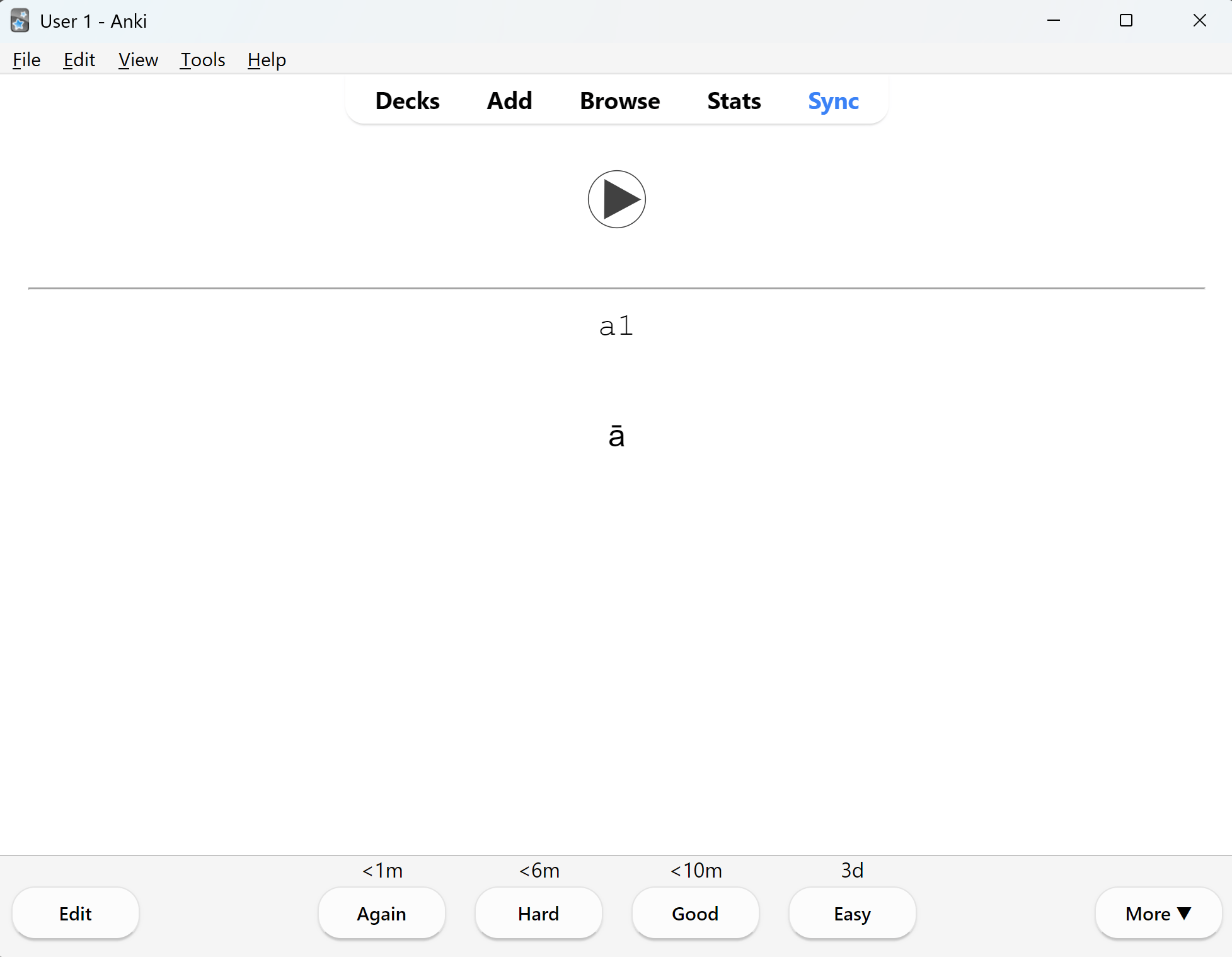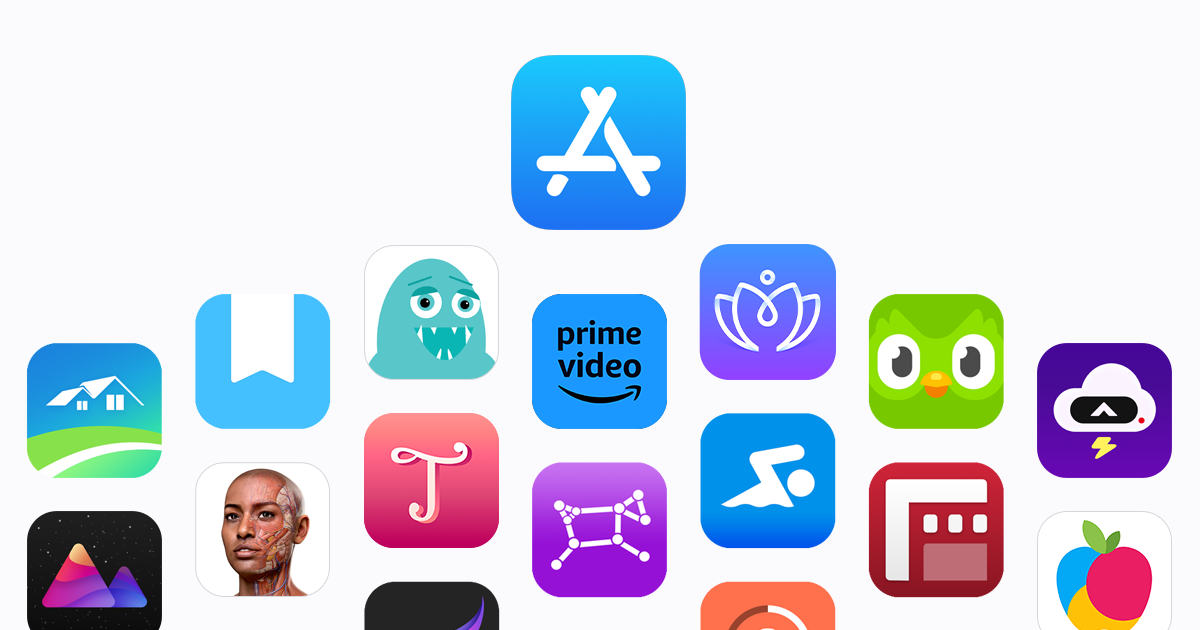Introduction to Pronunciation
Before you dive into studying Chinese, spend about a week learning pinyin and Chinese pronunciation. You don’t have to master it before you use other materials, but you should have a good understanding of how Chinese pronunciation and tones work, then continue to build upon this foundation as you learn vocabulary and grammar.
Pronunciation in a foreign language is critical because it affects a native speaker’s ability to understand you, which is especially true for a tonal language such as Chinese. It may also affect your confidence when speaking if you have to keep repeating yourself. You should be aware of the phonetics and the pronunciation of a language early on and continue to build on them during your language journey. Don’t overly stress about your accent, though; it’s ok to have an accent in a foreign language. in fact, many Chinese people really like foreign accents. Rather, your goal should be to be easily understandable and have good pronunciation. I wouldn’t recommend going for a perfect native-like accent unless that is something you are really interested in. In Chinese, it is very difficult to have a native-like accent, and even just an understandable accent takes a lot of time to develop. When you first start studying Chinese, you won’t be able to hear many of the subtle differences in pronunciation or tone, but as you become more familiar with the language, you will build an ear for these differences. Focus a lot on pronunciation in the beginning, especially tones. If you don’t have a strong understanding of tones, it will heavily impact the level of your Chinese. Make sure you learn the pronunciation and tone of new words as you come across them, because it is very difficult to go back and pick it up later.
I want to share a few examples from my own experience to highlight just how important it is to learn proper pronunciation in Chinese. I’m not someone who picks up pronunciation easily, as I have very little control over my voice, and I don’t have any musical training, so I was much worse than your average new Chinese learner. The very first time I tried practicing Chinese with my partner, I couldn’t hear the tones at all. Every word I said was wrong, and he had to correct me over and over. Because I struggled so much in the beginning, I became really self-conscious about speaking Chinese. When I would hear words and try to ask my partner what they meant, he often couldn’t understand me.
I spent months practicing on my own, and eventually I found some native speakers through online language exchange sites who helped me work on my pronunciation. It took almost two years before I felt truly comfortable pronouncing Chinese words. When I first started, I would often get blank stares from Chinese speakers because they simply couldn’t figure out what I was trying to say, and didn’t want to be rude. If you’re learning Chinese, this is something you’ll almost definitely experience too. But with time, it’s gotten much easier. Now, I only get confused looks occasionally, usually when I’m trying to use new words I haven’t fully mastered yet.
I’m not saying this to scare you, but to reassure you that this is completely normal for Chinese learners. Chinese isn’t like Spanish or German, where you can often be understood even if your pronunciation is off. For example, my partner has never studied German, but sometimes he’ll read a text aloud or ask me what a word means, and I can almost always understand him. With Chinese, though, it doesn’t work that way. It can feel unfair when you’ve spent so many hours studying, only to not be understood. But you can’t let that discourage you. Chinese has a lot of words that sound very similar, and even small differences in pronunciation can completely change the meaning of what you’re trying to say. On top of that, most Chinese speakers aren’t very used to hearing foreign accents, so it’s harder for them to recognize mispronounced words. That said, Chinese speakers are incredibly kind and patient. They won’t make fun of you for getting things wrong, and they’ll usually do their best to understand you. So don’t let the fear of messing up hold you back. If I can do it, so can you!
Pinyin and Tones
Pinyin is the first step to developing good pronunciation in Chinese. It is the phonetic system you will use to learn new words and to type. YoYo Chinese has a great course introducing you to pinyin and tones, with quizzes and a pinyin chart where you can listen to all the sounds in the language. It’s ok if you don’t get every sound the first time; you will see and hear pinyin a lot over the course of your studies.

For review and more input, Grace Mandarin Chinese also has a great series on Chinese pronunciation and tones.
Chinese Pinyin Game
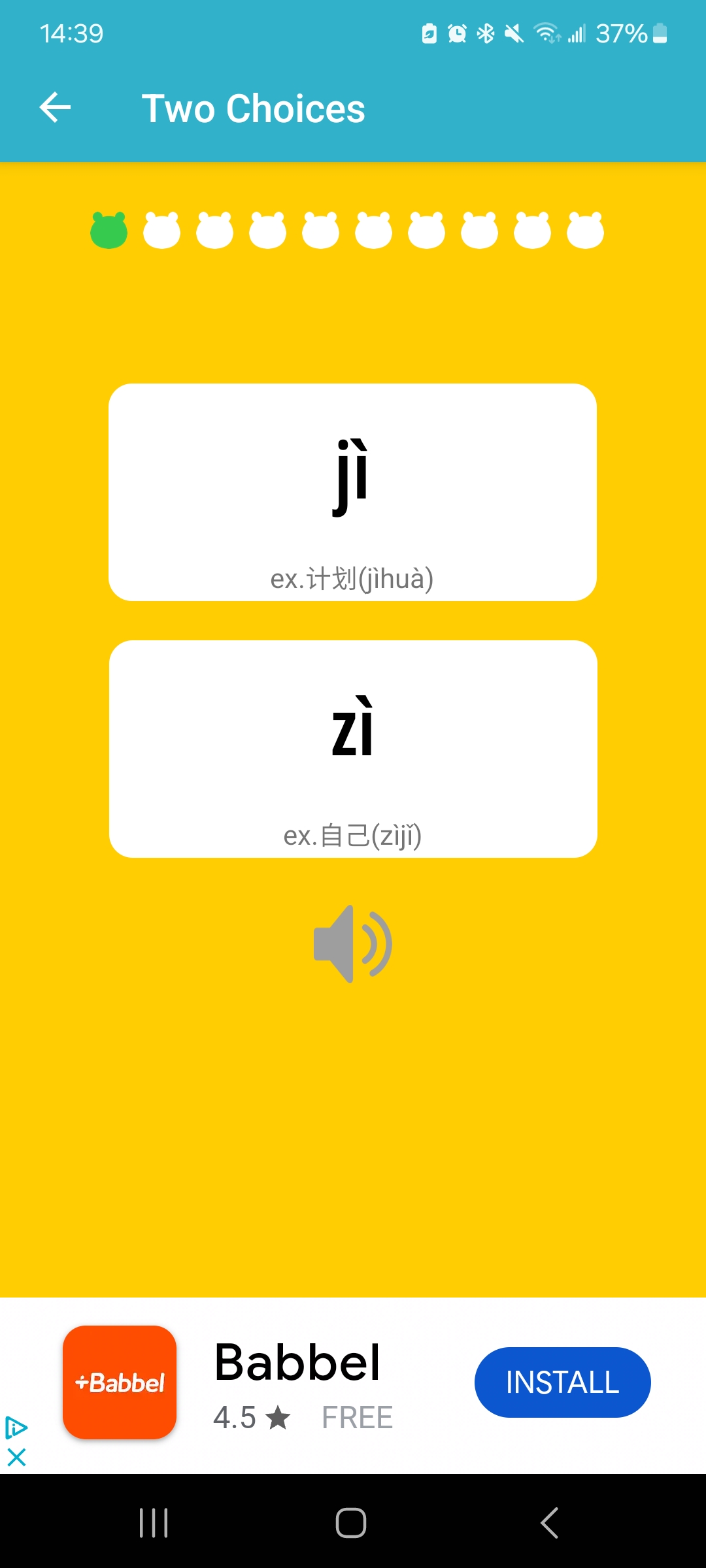
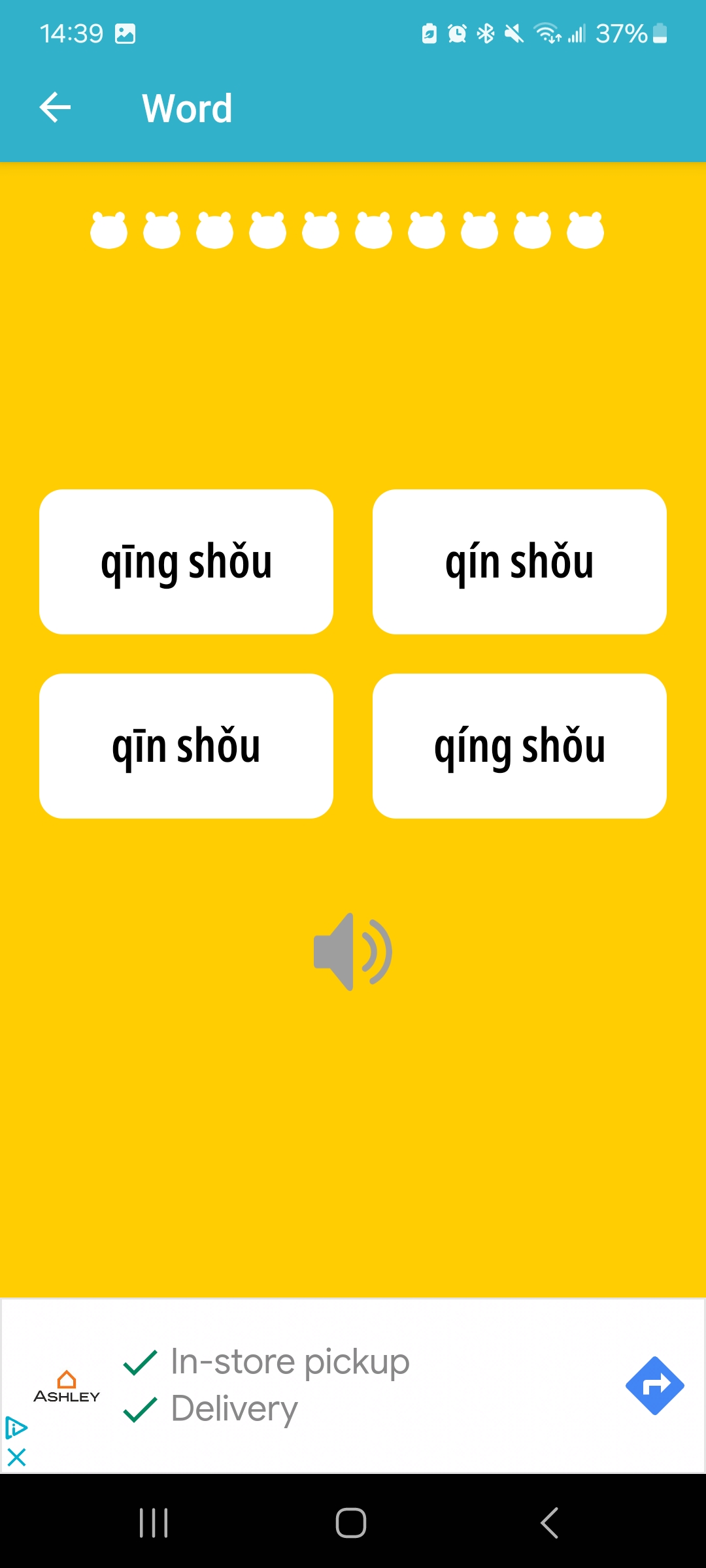
YuYin
YuYin is an incredible website for learning how to properly pronounce Mandarin Chinese! If you are still working on your ability to recognize tones, I recommend starting with the “Tone Recognition” game! In this game, you will hear an audio clip and then select which tone you hear. Keep practicing this regularly until you can consistently recognize the four different tones!
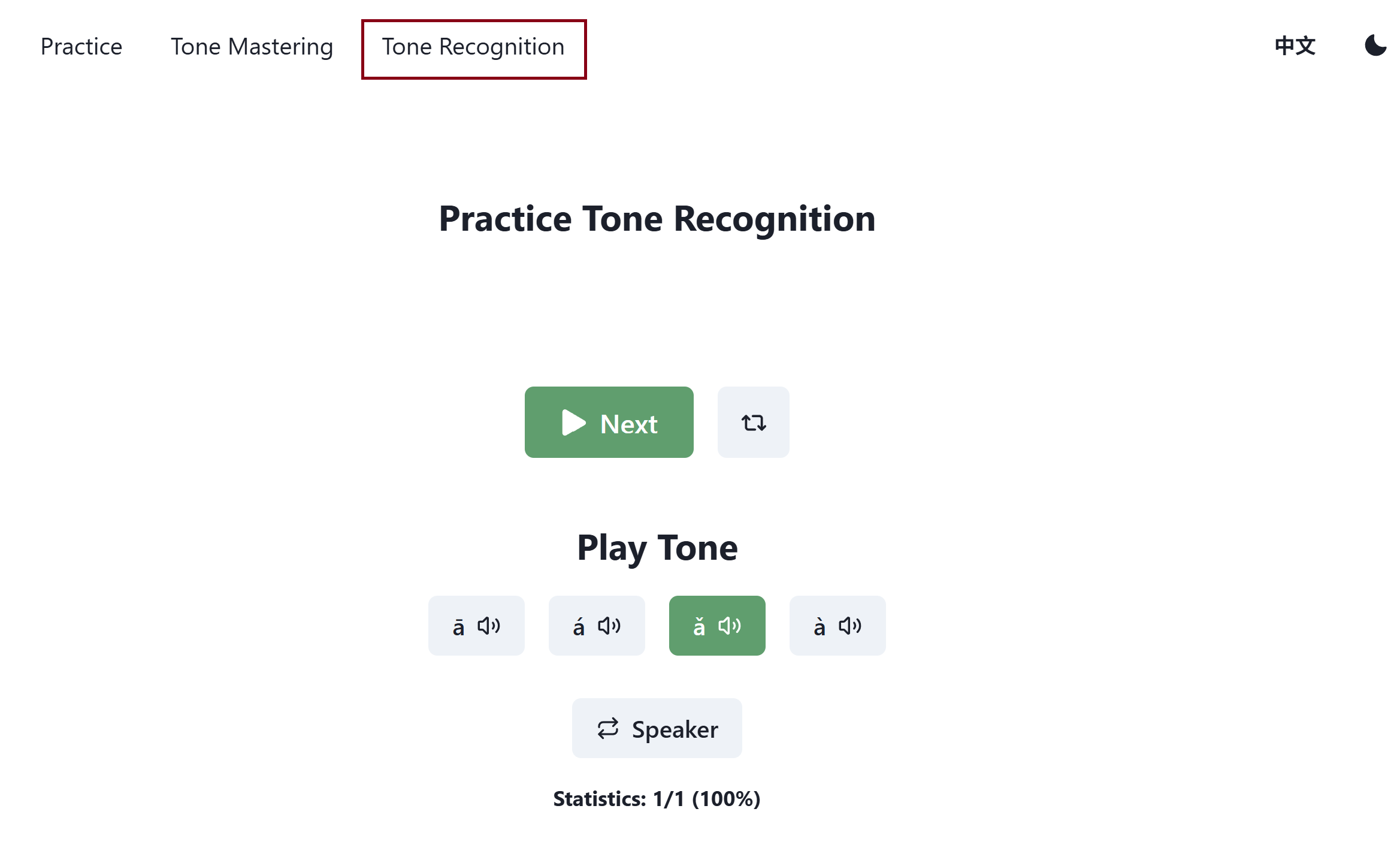
If you’re already familiar with the four tones of Chinese, then you can switch to focusing on being able to say them yourself. That’s where the “Tone Mastering” game comes in handy! In this game, you will be given a word to say, then you will record yourself using the green record button at the bottom center of the screen. If you need to hear how the word is pronounced, you can click on the speaker button on the bottom left side.

After you record yourself saying the word, you will get feedback on how you did. The analysis will be green if you said the word correctly! You will also see a spectrogram, which allows you to visualize the tone of your speech. In the graph below, you can see how the tone visibly drops for a falling tone.
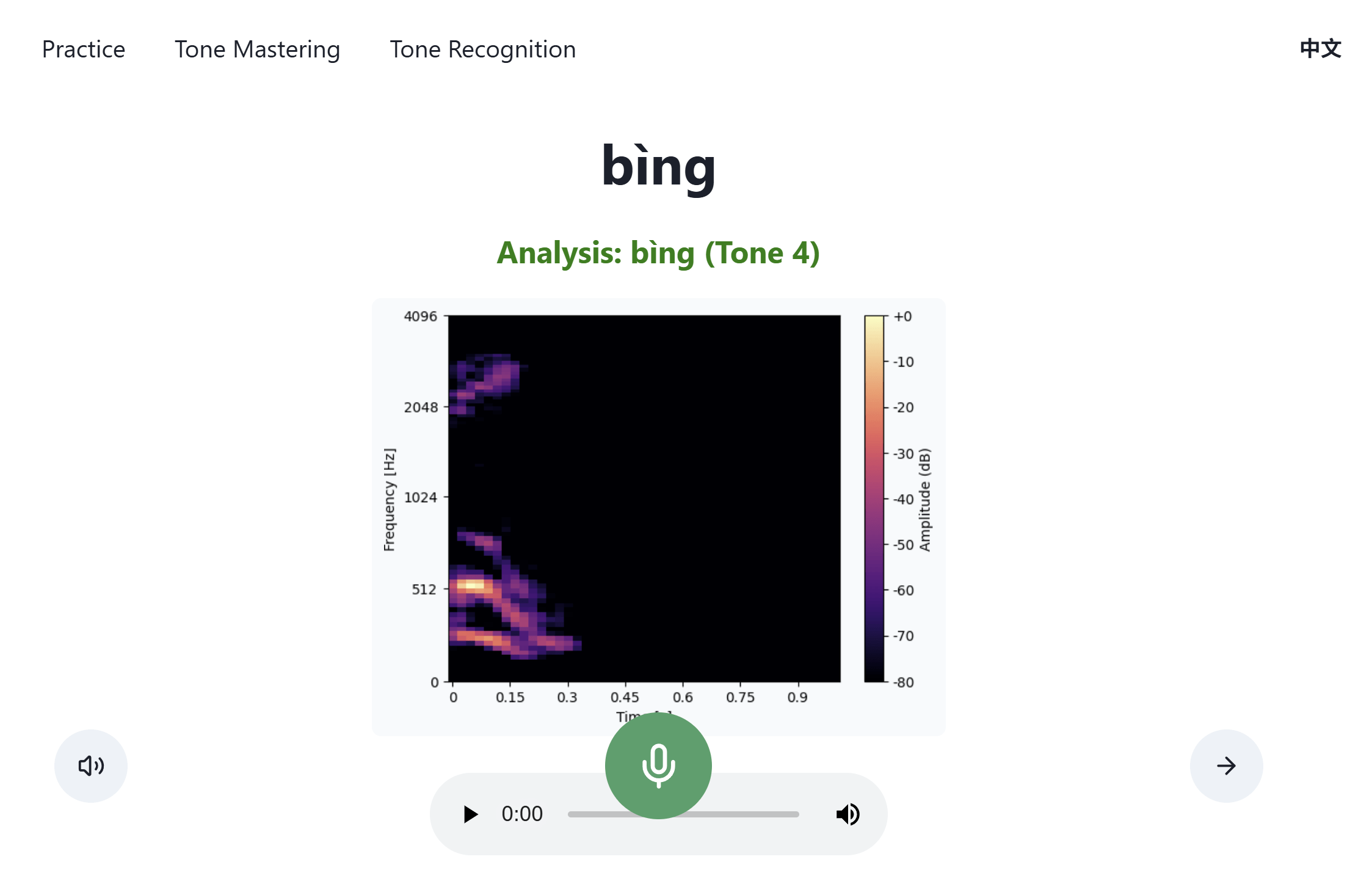
If you said a word with the wrong tone or pronunciation, the analysis will be red. Here, you can see on the spectrogram that my tone was flat instead of falling.
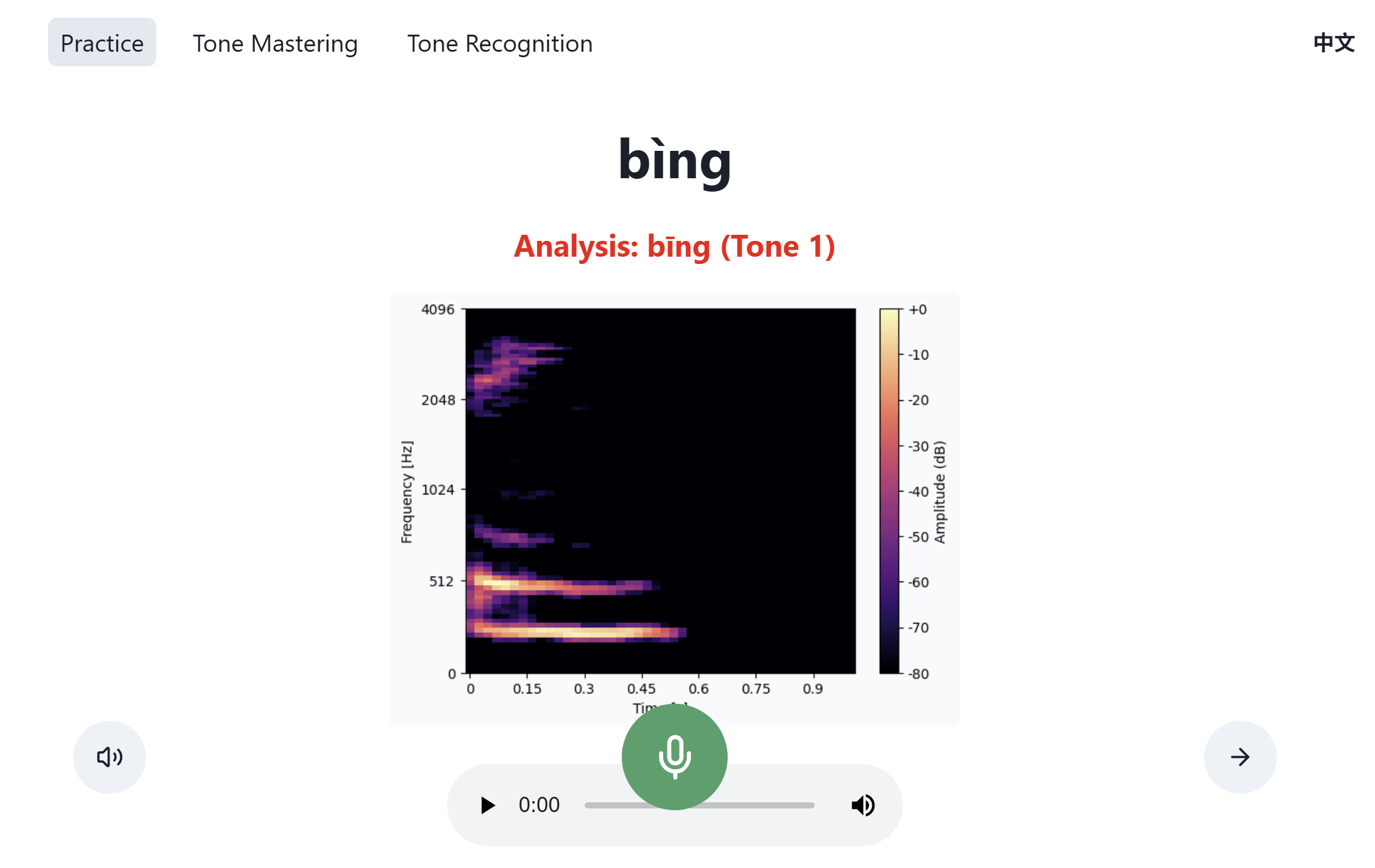
Once you have a good grasp on how to say each tone in isolation, it’s time to start putting them together through practice. In this game, you will be given a sentence to say out loud. You can use the microphone or turtle buttons on the right side of the sentence to hear it before you try to say it yourself.

Once you have recorded yourself saying the sentence, you will receive feedback on your pronunciation. If your overall score is green, then you pronounced the sentence well! Prosody tends to be by far the hardest to score well on, so don’t be too hard on yourself if you struggle with it. Focus more on your accuracy in the beginning! Prosody takes a lot of time to build!
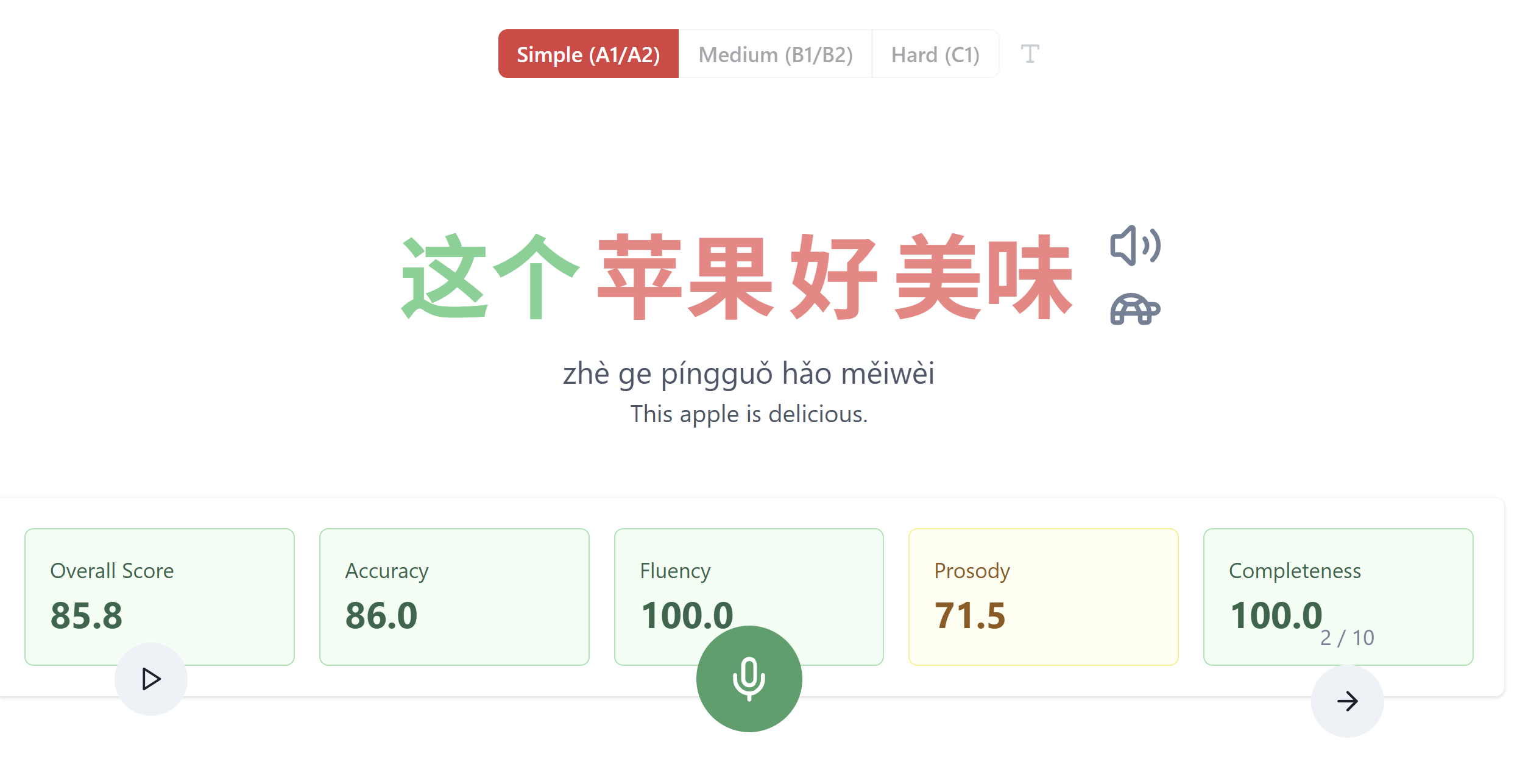
To see more details about how you pronounced a word, either hover over it or click on it. Here, you can see that I pronounced the tone of this word incorrectly. In that case, I would repeat the sentence, focusing on improving my tones. If your pronunciation or tone is incorrect, you should always try to say the sentence again correctly. However, if you’re really struggling with a specific word even after practicing it a few times, it’s best to move on to a different sentence and come back to it later.
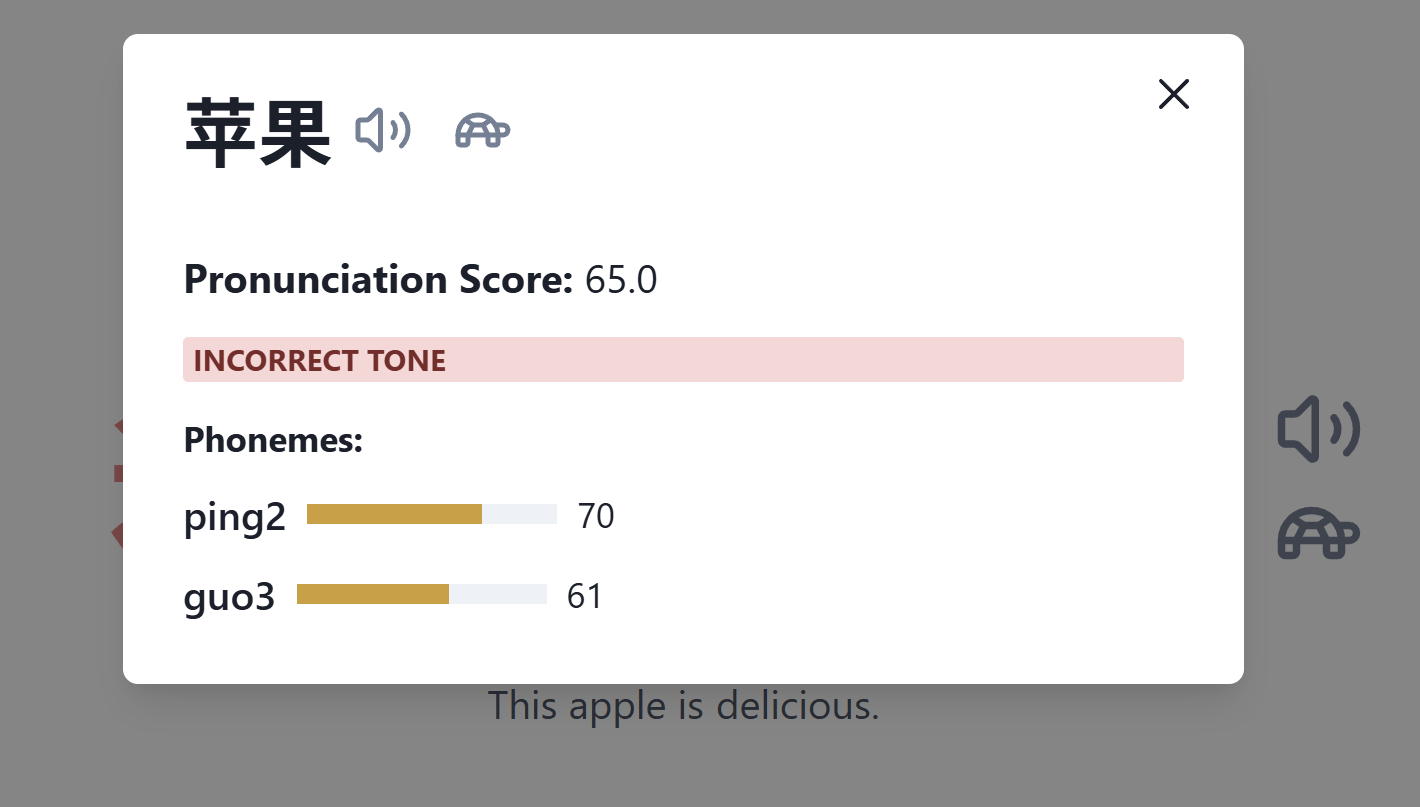
For this word, you can see that the pronunciation score is quite high, so I would move on to a new sentence instead of trying to perfect this one. Missing a break is a minor mistake that can be difficult to correct as a beginner or non-native speaker, so I wouldn’t focus too much on it. Instead, keep practicing by saying more words and sentences!
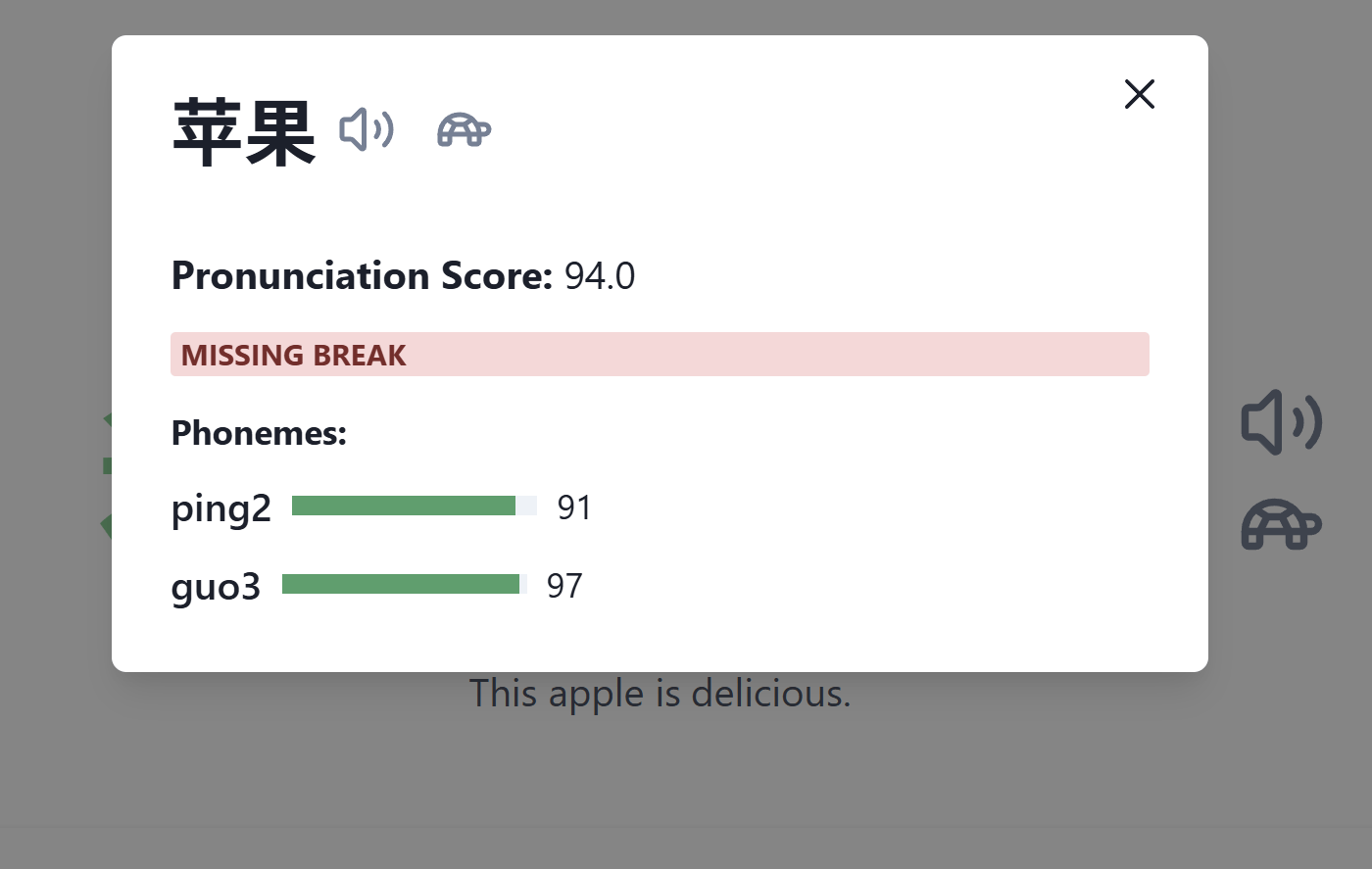
With a free account, you get 10 practice sentences per day. This is more than enough to help you build a solid understanding of Chinese pronunciation, as long as you’re consistent about practicing! If you would like more advanced practice sentences and to improve your tones and pronunciation faster, the premium version is $5 a month.
Practicing with Native Speakers
After learning the basics of Chinese pronunciation, practicing with native speakers and having them point out your pronunciation mistakes will help your speaking abilities a lot. You can use language exchange sites like the ones listed below to connect with native speakers. I recommend Conversation Exchange if you’re looking for someone more serious about language learning. Once you’ve found a good partner, it’s a good idea to switch to a platform like WhatsApp or Discord to stay in touch more easily and schedule calls. Be clear that you are a beginner, and you’re looking for someone to help you practice your pronunciation. You’ll want to find someone who is high-intermediate to advanced in English, so you can easily communicate. Many natives will jump at the chance to help a beginner because they know they will get a lot of English practice out of it.
If you’re a young woman, especially a native English speaker, it can be overwhelming how many people reach out. That’s why I suggest focusing on finding just one person you connect with, then moving the conversation to a different platform. Sometimes you will come across older people who teach their native language as a hobby and as a way to connect with others. They often make really good language exchange partners for beginners, and they usually don’t care if English isn’t your native language.

Once you have a language partner, the next step is to schedule a practice session, either over voice or video call. I recommend keeping calls between 30 minutes to an hour. Before the session, discuss with your partner what they hope to get out of the exchange, so you’re both on the same page. For your part, prepare by finding a few short articles in Chinese to bring to the session. If it’s a video call, you can share your screen so your partner can follow along with the text. If it’s a voice call, send them the article in advance. During the call, read the article out loud, doing your best to pronounce each word clearly. Ask your partner to write down any words or sentences you struggled with, either in the chat or in a shared document. Once you’ve finished reading, have them send you their notes. Then, go over each word or sentence together, focusing on correcting your pronunciation one mistake at a time.
Keep in mind that some partners are better at catching and correcting mistakes than others. If your partner isn’t very attentive or helpful in this area, it’s okay to find someone who better suits your needs. When I end language exchange communications, I usually just politely tell them that I don’t have the time to schedule more meetings. Most understand that this isn’t necessarily a long-term exchange. Another good practice is to record your language sessions, so you can go back and review your mistakes. However, make sure you get your partner’s permission before you do this.

Anki
